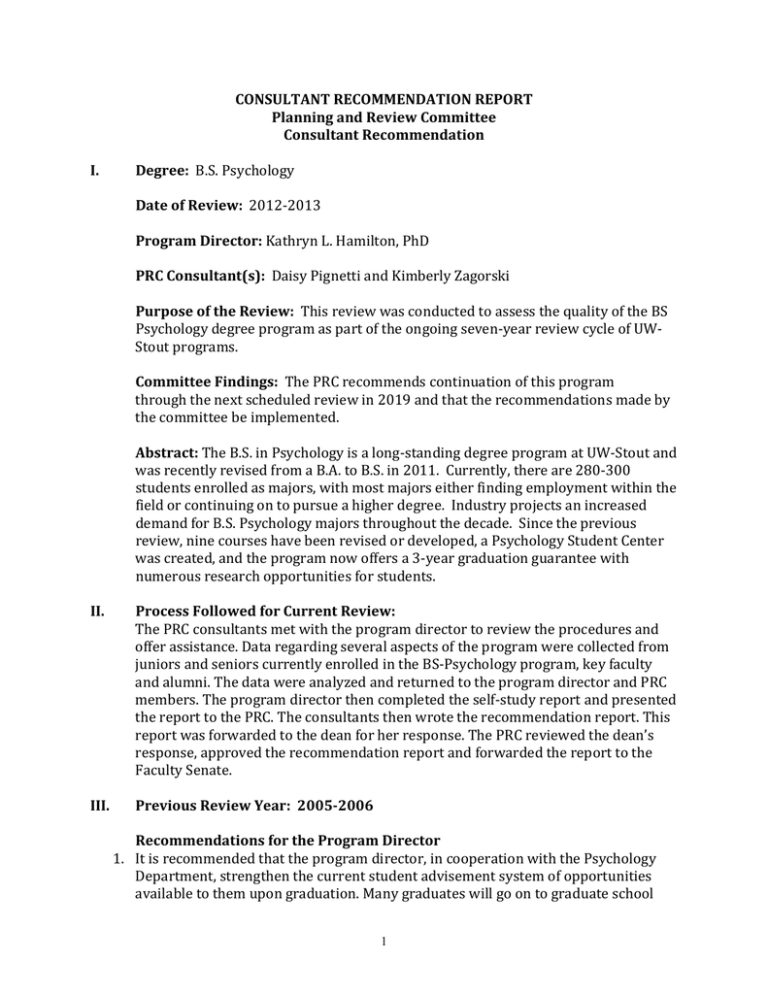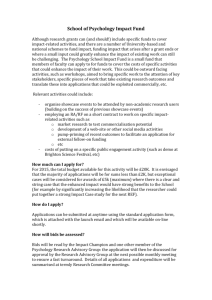CONSULTANT RECOMMENDATION REPORT Planning and Review Committee Consultant Recommendation
advertisement

CONSULTANT RECOMMENDATION REPORT Planning and Review Committee Consultant Recommendation I. Degree: B.S. Psychology Date of Review: 2012-2013 Program Director: Kathryn L. Hamilton, PhD PRC Consultant(s): Daisy Pignetti and Kimberly Zagorski Purpose of the Review: This review was conducted to assess the quality of the BS Psychology degree program as part of the ongoing seven-year review cycle of UWStout programs. Committee Findings: The PRC recommends continuation of this program through the next scheduled review in 2019 and that the recommendations made by the committee be implemented. II. Abstract: The B.S. in Psychology is a long-standing degree program at UW-Stout and was recently revised from a B.A. to B.S. in 2011. Currently, there are 280-300 students enrolled as majors, with most majors either finding employment within the field or continuing on to pursue a higher degree. Industry projects an increased demand for B.S. Psychology majors throughout the decade. Since the previous review, nine courses have been revised or developed, a Psychology Student Center was created, and the program now offers a 3-year graduation guarantee with numerous research opportunities for students. III. Previous Review Year: 2005-2006 Process Followed for Current Review: The PRC consultants met with the program director to review the procedures and offer assistance. Data regarding several aspects of the program were collected from juniors and seniors currently enrolled in the BS-Psychology program, key faculty and alumni. The data were analyzed and returned to the program director and PRC members. The program director then completed the self-study report and presented the report to the PRC. The consultants then wrote the recommendation report. This report was forwarded to the dean for her response. The PRC reviewed the dean’s response, approved the recommendation report and forwarded the report to the Faculty Senate. Recommendations for the Program Director 1. It is recommended that the program director, in cooperation with the Psychology Department, strengthen the current student advisement system of opportunities available to them upon graduation. Many graduates will go on to graduate school 1 and these students should be made aware the on- and off-campus graduate programs that would best fit with their degrees and interests. Those students who don’t plan on going to graduate school (or who, in effect, end up not going to graduate school) should be advised of the employment opportunities that are open to them. Response: The program director will continue to offer planned academic and career advising workshops to the faculty in the Department of Psychology. We will develop a far more conscious awareness of the importance of integrating and balancing academic and career/job opportunity advisement through the faculty advising system, and in our courses. In addition, we will strengthen the advisement system of opportunities available to students going to graduate school OR obtaining employment upon graduation through the Freshman Seminar, meeting with the Psi Chi National Honor Society in Psychology and the Psychology Club, developing a capstone experience for graduating seniors, planning brown bag informal sessions with students and faculty to discuss these opportunities, and by working more closely with the Career Services Office and the Career Fair. 2. It is recommended that the program director continue to develop the importance of the Program Advisory Committee and its relationship to the program. Response: The Program Advisory Committee did not meet last year, but the program director considers this an exception, not a standard. It was a year of transition of program directors, attention was being given to implementing the new psychology program, there were no major academic/program issues or policy issues that arose during the year, and the program director does not believe in calling meetings unless there is a clear purpose for doing so. This year the program has an excellent group of professionals in the field, faculty and students on the Program Advisory Committee. The committee met for the first time on November 18, 2005, and had a spirited discussion on the development of a capstone experience for graduating seniors, learning outcomes for psychology students, and the “poly-tech” concept. The Program Advisory Committee is meeting again early spring to focus our discussion and planning on the capstone experience. Recommendations for the Psychology Department Chair 1. It appears that the Psychology Department will see a number of retirements of fulltime tenure track faculty members in the short-term. It is therefore recommended that the department chair develop a recruitment plan for the retirees’ positions as well as current part time and adjunct instructors. The careful recruitment of a new generation of tenure track faculty will ensure that the quality of Stout’s Psychology Department will not diminish. Response: 2 The faculty of the Department of Psychology appreciates this observation. One faculty resignation in August 2005 and a retirement planned for May 2006 have resulted in two approved searches for probationary faculty. Those two searches are proceeding well. Additionally, five of the remaining faculty in the department are likely to retire within the next five years. Consequently, recruitment of a new generation of faculty is indeed critical to the needs of the B.A. in Psychology. One department Profile and Planning Committee is charged with profiling the needs for faculty in programs served by the department. The committee includes the department chair, program directors for the B.A. in Psychology and the M.S. in Applied Psychology, a representative of the Personnel Committee and a representative of the Curriculum Committee. The Profile Committee makes recommendations to the department of the whole on all profiling issues. Faculty profile needs include existing curricular and other faculty responsibilities of the department as well as planned curricular innovations or future leadership needs. Given the pending retirements of such a large percentage of department faculty, the faculty of the department, in a department meeting on 1/18/2006, supported a renewed effort to define and plan for department profile needs related to department leadership, current curriculum, and planned innovations in curriculum. The PRC observation that the department should develop recruiting plans for adjunct faculty is appropriate given the inordinate number of adjuncts hired (particularly during the time of the PRC review). In fall semesters in particular, the department hires between six and eleven adjuncts to fill behind faculty on sabbaticals, on leaves of absence, or resignations/retirements. A cadre of adjuncts with a history of employment in the department already exists. Additionally, a file of resumes of others interested in teaching in the department exists. In the future, the department has decided that his pool of past employees and interested others should be expanded through the UW-Stout Adjunct Pool and advertisements of opportunities in the department published through Ph.D. granting institutions in Minneapolis. 2. It is recommended that the department chair, in concert with the department faculty, should study and eliminate as needed, overlap of content in Research Methods and Experimental Psychology. Response: Indeed the B.A. in Psychology program places great emphasis on research design and statistics. This emphasis is by design and consistent with the American Psychological Association recommendations for academic curriculum in psychology. The two research courses identified by students as having overlap are core courses in the B.A. Psychology program. Each is a four-credit lab course. Some repetition in content across the two courses is advised. Students learn through having important content repeated and re-emphasized. However, in the department meeting of 1/18/2006 the faculty who typically teach the two courses agreed to meet 3 throughout the spring semester of 2006 to discuss sequencing of topics across the two courses and develop strategies to eliminate any unnecessary overlap of content. 3. It is recommended that the department chair, in scheduling courses, work with the key program instructors as well as students to identify and reasonably alleviate any scheduling conflicts for required courses. Response: Scheduling approximately 80 sections of courses for as many as 28 instructors per semester can on occasion create scheduling conflicts. However, whenever conflicts have been noted, immediate corrections have been made. At the present time, the department chair and faculty of the department are not aware of any scheduling conflicts of required and selective courses within the B.A. in Psychology program. We make attempts to avoid scheduling conflicts of psychology courses with popular courses in the natural sciences. In addition, we do offer weekend courses and have a large and growing selection of psychology courses offered completely online. These alternatives avoid scheduling conflicts. The department chair emphasizes the importance of program directors examining class schedules for courses within specific programs to avoid conflicts. 4. It is recommended that the department chair continue efforts to assist current faculty in the development/refinement of their teaching skills. IV. Response: Since the PRC report of December 14, 2005, the department has not specifically addressed this recommendation. This topic has been brought to the attention of the faculty and is on the agenda of the next department meeting. Our intention is to consider this recommendation as essential to our department mission. While we believe that overall the PRC review suggests very positive feedback for the quality of our faculty and instruction, continuous improvement requires continuous attention. We will continue to assign faculty mentors to new faculty and adjuncts, evaluate all instructors on the quality of instruction, and place high priority on teaching. However, the department intends to examine additional strategies to refine instruction quality. Current Year Program Review: 2012-2013 Program Strengths-Indicate Source: • Employment and educational continuation rate of graduates (PD report) • Assessment of Program Objectives through Educational Testing Service Major Field Test, Writing Assessment, and Experiential Learning Assessment (PD report) • Incorporation of diversity into the curriculum, numerous research opportunities for students, and flexibility and relevance of the curriculum. (PD report, advisory board, Key Faculty, student surveys) 4 • • Program director providing strong, capable, leadership (PD report, advisory board, key faculty surveys, student surveys.) Professors (PD report, advisory board, key faculty surveys, student surveys.) Issues of Concern-Indicate Source: • Curriculum: overlap in course content; need for written communication skills and to strengthen research methods sequences; “limited seating” courses not offered enough; preparation for field experience and post-graduation planning (PD report, Advisory board report, Key Faculty, student surveys) • Need for more tenure track faculty to teach needed areas of expertise (PD report, Advisory Board report) • Inadequate lab facilities (light, noise and electromagnetic pollution) and resources (computers, software, polling equipment.) (PD report, Key Faculty, student surveys) • Need for professional journals in library (PD report, Key Faculty) Recommendations for the Program Director: • Work with Department Chair to identify areas of expertise/course vacancies that new hires will need to cover. • Work with Department Chair to schedule more sections of courses that have limited seating. • Work with faculty to review potential cases of overlap in course content as well as increasing writing and research skills. • Work with Department Chair and the Dean of CEHSS to improve lab facilities and resources both during and after the Harvey Hall Remodeling project. • Work with the Collection Development Librarian to request journals be added to library collection. Recommendations for the Chair of Department of Psychology: • Work with Program Director to identify areas of expertise/course vacancies that new hires will need to cover. • Work with Program Director and faculty to schedule more sections of courses that have limited seating. • Work with Program Director and CEHSS DEAN to improve lab facilities and resources and to locate funds for students to take the Educational Testing Service Majors Field Test. Recommendations for the Dean of the College of Education, Health and Human Sciences 5 • • Work with Program Director and Department Chair to recruit new faculty to teach needed courses. Work with Program Director and Department Chair to seek ways to improve lab facilities and resources both during and after the Harvey Hall Remodeling project. 6



